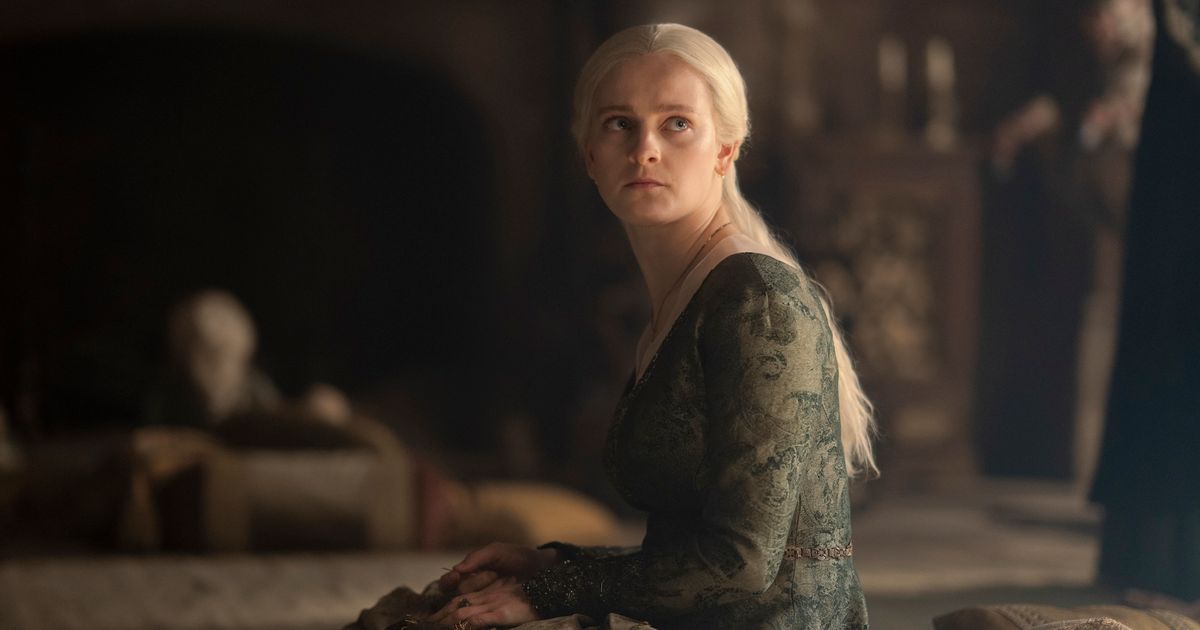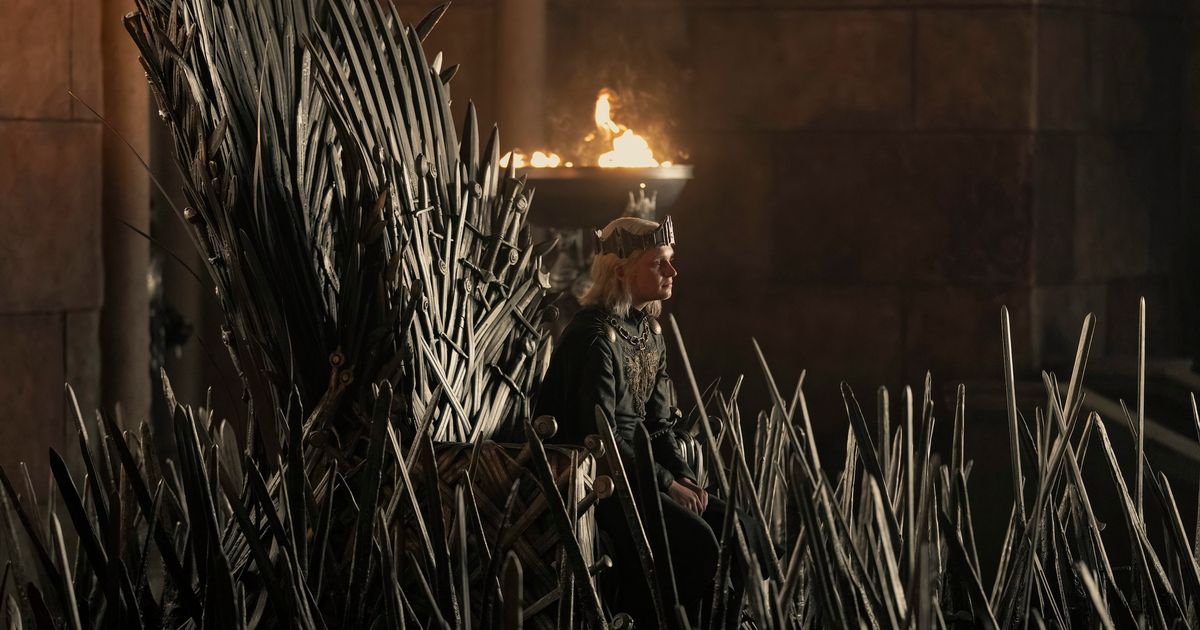Two seasons into HBO’s “House of the Dragon” and here’s what I know: pre-”Game of Thrones” Westeros had lots of very cool dragons and absolutely no sense of humor. Never have I longed for a Lannister takeover more.
The first season was all about succession — with none of the satirical bite or even humanity of “Succession” — and ended with the House of Targaryen split between those who support Rhaenyra (Emma D’Arcy) and those who hastily installed her younger half-brother Aegon (Tom Glynn-Carney) on the throne.
The second season, which concluded Sunday, was devoted almost entirely to each side assembling the armies (and dragons) necessary to fight. Short on riders, Rhaenyra, who is hoping that somehow more dragons will equal less war, has taken the desperate measure of enlisting ”common” people who have enough Targaryen blood to avoid being roasted on sight (though many of them did not survive this particular Sorting Hat process).
The finale ended with dragons wheeling, banners flying and music swelling as various characters stared soulfully into the future, but all I felt was exhausted.
Not in the good, edge of your seat, please-don’t-let-[fill in the blank]-die kind of way that marked virtually every episode of its progenitor, “Game of Thrones.” No, this is more the fatigue of frustration — I want to like this show so much but it refuses to lighten up enough to let me in.
Whoever said “blondes have more fun” was clearly unacquainted with the early Targaryens. “House of the Dragon” has big action scenes, gory deaths, nefarious plotting, steamy sex and, of course, glorious CGI dragons aplenty, but none of the characters are any fun at all.
The feisty Rhaenyra of last season has become a pacing, fretting hand-wringer. Her husband/uncle Daemon (Matt Smith), previously a kinky firebrand, spent much of this season flailing about in the damp ruin of Harrenhal, his task of mustering the Riverlands impeded by what appeared to be a bad acid trip and his own “call me King” ambitions. Prince Jacaerys (Harry Collett) moped around, wishing he were blond and forcing his betrothed Lady Baela (Bethany Antonia), to trail after him urging him to snap out of it. Her as yet dragonless sister, Lady Rhaena (Phoebe Campbell), was sent to the Vale, where she was clearly and monotonously miserable, and Princess Rhaenys (Eve Best), the only Targaryen with any wit or style, is dead.
She went out in a blaze of glory, but now there appears to be no one left in Westeros who understands the power of the side-eye.
Even the clear villains of the piece — bratty King Aegon, his psychotic brother Aemond (Ewan Mitchell) and their devious Uriah Heep of an advisor, Larys Strong (Matthew Needham), manage, against all odds, to be boring.
If an evil leader and his henchmen can’t quip, what’s the point of a coup?
It’s enough to make one long for “Game of Thrones’” Joffrey — sure, he was a monster, but at least he looked like he was enjoying himself. And Cersei … well, there’s no point in looking back. It’s just too painful.
And unnecessarily painful to boot. “House of the Dragon” co-creator Ryan Condal has all the makings of a truly great show if only he would stop taking everything so seriously. When, in the finale, tavern-fly turned dragon rider Ulf White (Tom Bennett) told a gathering of Targaryens that “a sense of humor would do you all good,” I literally cheered.
Ulf was reacting to being reprimanded for his table manners but he could have been talking to the writers’ room.
In what world do you cast Matt Smith and then refuse to give him any witty asides? Why bother assembling at least two full royal courts without throwing in a jaded minister, a worldly wise paramour or a tart-tongued sibling? Where is the Targaryen equivalent of Roman Roy?
No matter how high the stakes, or what the genre, most of the best action-adventures and/or power plays are notable for humor. Look at “Slow Horses” on Apple TV+, a high-body-count espionage thriller with more witty dialogue than most comedies. Or stay on HBO and view “Succession,” “The Sopranos” or “Deadwood,” deep and violent contemplations of power that understood the need for moments of comedy.
Humor is the strongest connective tissue between fiction and its audience, and fantasy, like horror, has a higher believability bar than most genres. To accept the presence of dragons, or zombies, or superheroes, the characters have to emotionally resonate with the audience: This is how I might behave when struggling to survive the unimaginable.
Is no one in “House of the Dragon” capable of saying the Westerosian equivalent of “we’re going to need a bigger boat”?
Laughter allows the audience to breathe — dramatic tension only works if there are moments of contrast. Epics especially rely on the presence of small moments to counteract and empower the big sweeping scenes. That’s why the sidekick was invented. Why are there no sidekicks in “House of the Dragon”? There are approximately 437 non-main characters who show up now and then for expository purposes; surely some of them could attempt to lighten the mood, or be anxious in a biting or mildly hilarious way.
I had high hopes as the second season expanded its stories away from the Targaryens, but thus far only Ulf seems to understand the problem. Maybe now that he’s got a dragon, his truth-telling will carry more authority.
I understand the desire for “House of the Dragon” to separate itself, tonally and narratively, from “Game of Thrones,” but far too often, as franchises grow, they throw out the barbed wit with the bathwater.
Over at Amazon Prime Video, “The Lord of the Rings: Rings of Power” has similar problems. In his epic work, J.R.R. Tolkein left what humor there was to the hobbits (and occasionally Gandalf). When Peter Jackson adapted it to film, he amplified (and sometimes simply inserted) humorous exchanges; Legolas did not, for example, ask Gimli, “Shall I find you a box?” when they stood on the ramparts of Helms Deep in the book. But like the Targaryens, the elves and men of “The Rings of Power,” are far too stiff-necked to make any sort of joke.
Marvel too has struggled. Though it built its cinematic universe on Robert Downey Jr.’s Tony Stark, whose superpower was not the suit but the one-liners, recent offerings have been, with a few exceptions, increasingly earnest.
“Deadpool & Wolverine” is currently cleaning up at the box office in some measure because it is very funny, Deadpool being a low-rent Iron Man — never too busy saving the world to hit his colleagues (and the audience) with a zinger.
Obviously, Deadpool has no place in Westeros and no one wants to see Ulf or the sly Larys breaking the fourth wall to make a butt joke. (Seriously, no one wants that.) But for drama to have impact, it has to provide moments of release. Yes, we remember battle cries and promises of vengeance, but most often audiences cling to lines that resonate because they acknowledge the seriousness of the situation with the most human of reactions: cracking a joke.















